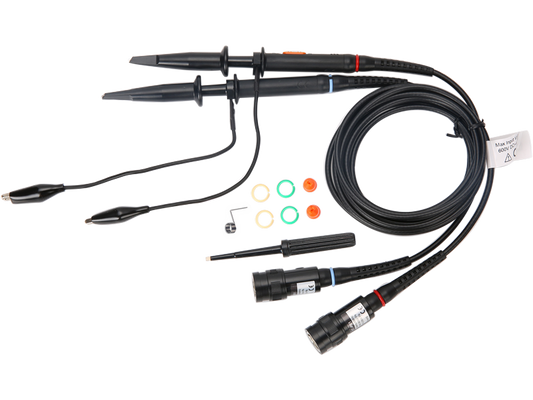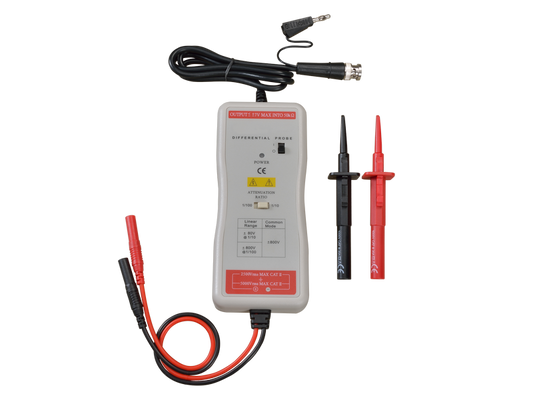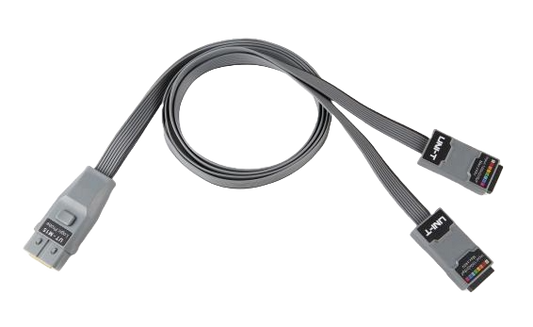Key Features
• Complete PCIe 1.0 and 2.0 protocol decoding and analysis
Compatibility Information
Compatible Models: MSO8804HD, MSO8504HD
Installation: Software license activation - no hardware modification required
Supported Standards: PCI Express 1.0, 2.0 specifications
Signal Requirements: PCIe differential lanes on oscilloscope analog channels
Bundle Savings Opportunity
This option is included in the MSO8000HD-BND Protocol Analysis & Jitter Suite ! Get this capability plus 15 other protocol analysis options and jitter analysis for just $5,399 - saving you $10,583 (66% off) compared to purchasing options individually.
The bundle features perpetual licensing with zero recurring fees, potentially saving $10,000+ over the instrument's lifetime compared to competitors' subscription models.
UNI-T MSO8000HD-PCIe2 Analysis Capabilities
Comprehensive PCIe Protocol Stack Analysis
The PCIe2 option provides complete analysis across all PCIe protocol stack layers, from physical layer 8b/10b encoding through Transaction Layer Packets (TLPs). The analyzer automatically decodes TLP headers including address information, transaction types, and payload data, while simultaneously monitoring Data Link Layer Packets (DLLPs) for flow control and error recovery mechanisms.
Advanced link training analysis monitors the Link Training and Status State Machine (LTSSM), providing detailed visibility into PCIe link initialization, speed negotiation, and lane configuration processes. This capability is essential for debugging PCIe enumeration issues and validating proper link establishment in complex multi-device systems.
High-resolution signal analysis enables PCIe physical layer characterization
Advanced Transaction Analysis
The PCIe2 option delivers sophisticated transaction-level analysis that tracks memory reads/writes, I/O operations, configuration transactions, and message passing between PCIe devices. The analyzer correlates request and completion packets, measures transaction latencies, and validates proper transaction ordering rules essential for PCIe protocol compliance.
Credit-based flow control monitoring provides real-time visibility into PCIe buffer management, enabling engineers to optimize data throughput and identify potential bottlenecks in PCIe system performance. The flow control analysis is particularly valuable for validating proper buffer sizing and credit management in high-performance PCIe applications.
Physical Layer Integration and Signal Quality
The unique combination of protocol analysis with the MSO8000HD's exceptional 8 GHz bandwidth enables simultaneous analysis of PCIe transaction content and physical layer signal integrity. Engineers can correlate protocol errors with signal quality issues, analyze 8b/10b encoding characteristics, and validate differential signaling parameters against PCIe specifications.
Multi-lane PCIe link analysis includes automated lane deskew measurements, symbol alignment verification, and inter-lane skew characterization essential for ensuring proper operation of x4, x8, and x16 PCIe links. The high-speed sampling capabilities enable accurate capture of PCIe 2.0's 5 GT/s signaling rates.
Error Detection and Recovery Analysis
Comprehensive error detection capabilities monitor all PCIe error types including correctable and uncorrectable errors, poisoned TLPs, and link-level retry mechanisms. The analyzer tracks error rates, recovery sequences, and provides detailed analysis of Advanced Error Reporting (AER) mechanisms essential for validating PCIe system reliability.
Professional Applications
Computer System and Motherboard Validation
Validate PCIe implementations in computer systems, motherboards, and expansion cards to ensure proper enumeration, configuration, and data transfer performance. The PCIe2 option enables comprehensive analysis of multi-device PCIe systems, switch fabric behavior, and proper resource allocation across complex PCIe topologies.
Embedded Computing and Industrial Applications
Industrial computers and embedded systems increasingly rely on PCIe for high-speed data acquisition, FPGA communication, and peripheral interfaces. The PCIe2 option enables validation of embedded PCIe implementations, analysis of real-time data transfer requirements, and troubleshooting of PCIe integration issues in harsh industrial environments.
Graphics and High-Performance Computing
Graphics cards, accelerator cards, and high-performance computing applications demand maximum PCIe performance and reliability. The PCIe2 option provides the analysis capabilities needed to optimize PCIe bandwidth utilization, validate high-speed data streaming, and ensure proper operation under sustained high-throughput conditions.
Storage and RAID System Development
PCIe-based storage solutions including NVMe SSDs and RAID controllers require comprehensive protocol validation to ensure data integrity and performance. The PCIe2 option enables analysis of storage-specific PCIe usage patterns, validation of NVMe command processing, and optimization of storage system performance.
Frequently Asked Questions
Can the PCIe2 option analyze both single-lane and multi-lane PCIe links?
Yes, the PCIe2 option supports analysis of x1, x2, x4, x8, and x16 PCIe configurations. For multi-lane analysis, multiple oscilloscope channels are used to capture different lanes simultaneously, enabling comprehensive lane deskew analysis and inter-lane timing characterization.
Does the option require special probing for PCIe differential signals?
PCIe uses high-speed differential signaling that requires appropriate probing techniques. Differential probes are recommended for optimal signal quality and accurate analysis. The MSO8000HD's high bandwidth and low noise characteristics ensure accurate capture of PCIe 2.0's 5 GT/s signaling rates.
How does the PCIe2 option handle link training analysis?
The option provides comprehensive LTSSM (Link Training and Status State Machine) analysis, tracking all link training phases including speed negotiation, lane configuration, and equalization. This capability is essential for debugging PCIe enumeration issues and validating proper link establishment.
Can I analyze PCIe transactions while simultaneously performing signal integrity measurements?
Yes, the PCIe2 option seamlessly integrates with all MSO8000HD signal integrity capabilities. You can simultaneously analyze PCIe transaction content, perform eye diagram analysis, measure timing jitter, and characterize differential signal quality for complete PCIe system validation.
What level of PCIe transaction detail does the analysis provide?
The PCIe2 option provides complete transaction-level analysis including TLP header fields, payload data, address information, transaction types, and timing relationships. The analysis includes credit flow control monitoring, error detection, and comprehensive transaction correlation for request-completion pairs.
Is PCIe protocol analysis included in the bundle package?
Yes, PCIe protocol analysis is included in the MSO8000HD-BND Protocol Analysis & Jitter Suite . The bundle provides 15 protocol analysis options plus advanced jitter analysis at a single price of $5,399 - saving 66% compared to purchasing options individually. As with all UNI-T software options, the bundle features a perpetual license with zero recurring fees, providing lifetime access without subscription costs that can save $10,000+ over the instrument's lifetime.
Master PCIe System Analysis
The MSO8000HD-PCIe2 option provides the comprehensive PCIe analysis capabilities essential for validating high-speed interconnect implementations, troubleshooting complex system interactions, and optimizing PCIe performance across computer systems, embedded computing, and industrial applications. By combining detailed protocol analysis with world-class signal integrity measurements, this option delivers complete insight into both transaction behavior and physical layer characteristics for robust PCIe system development.
Ready to analyze your PCIe systems with professional precision? Order the MSO8000HD-PCIe2 or get it included in the MSO8000HD-BND Complete Suite and save significantly on comprehensive high-speed protocol analysis capabilities.




